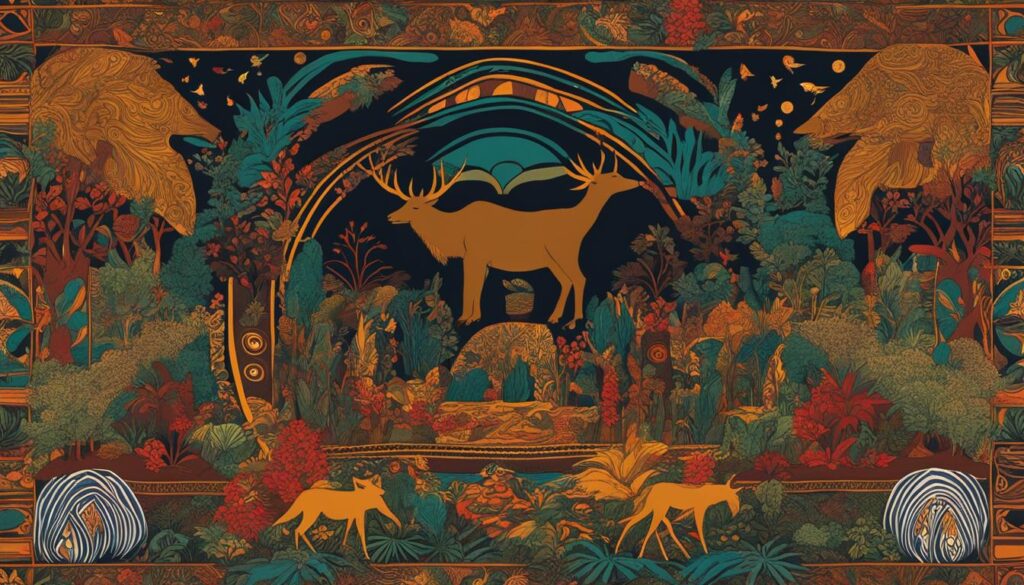African spirituality is a fascinating tapestry of traditions, beliefs, and practices that have been shaped by the diverse cultures and histories of the continent. It is a vibrant and dynamic collection of spiritual systems that have evolved over centuries, encompassing various aspects such as ancestral worship, the reverence of gods and goddesses, and spiritual rituals deeply intertwined with the daily lives of African communities.

Key Takeaways:
- African spirituality is a diverse and dynamic collection of spiritual systems shaped by the continent’s rich cultures and histories.
- It encompasses various aspects such as ancestral worship, the reverence of gods and goddesses, and spiritual rituals.
- These spiritual beliefs and practices are key elements of African cultural identity and serve as a foundation for community cohesion.
- Ancestral worship plays a crucial role in seeking guidance and protection from ancestral spirits.
- African spiritual rituals are deeply rooted in the cultural fabric of the continent and serve multiple purposes.
African Spiritual Practices and Beliefs
African spirituality is deeply rooted in the cultural fabric of the continent, encompassing a diverse range of practices and beliefs. These spiritual practices serve as a foundation for African communities, providing individuals with a sense of identity, purpose, and connection to the divine. The continent’s rich history and cultural diversity have given rise to various beliefs and rituals that are at the core of African spirituality.
One of the key aspects of African spiritual practices is the belief in gods and goddesses who have specific domains of influence. These deities are revered and worshipped, and they play a significant role in the lives of African communities. For instance, in Yoruba culture, there is a pantheon of gods known as Orishas, each representing different aspects of life, such as fertility, love, and wisdom. These gods and goddesses are invoked through rituals and ceremonies to seek their guidance, protection, and blessings.
African spiritual practices also involve communal gatherings, ceremonies, and rituals that aim to connect individuals with their ancestors. Ancestral worship is a central pillar of African spirituality, with ancestors being revered as intermediaries between the living and the spirit world. Through pouring libations, offering sacrifices, and communicating with ancestors through divination practices, African communities seek to maintain a spiritual connection with their lineage and seek guidance, protection, and blessings from their ancestors.
African Spiritual Beliefs and Practices Table
| African Spiritual Beliefs | African Spiritual Practices |
|---|---|
| Belief in gods and goddesses with specific domains of influence | Invocation of gods and goddesses through rituals and ceremonies |
| Belief in the existence of ancestral spirits | Ancestral worship through pouring libations, offering sacrifices, and divination practices |
| Connection between humans, ancestors, and the spirit world | Seeking guidance, protection, and blessings from ancestors |
| Community cohesion and collective well-being | Communal gatherings, ceremonies, and rituals |
African spirituality is a vibrant and multifaceted realm that plays a crucial role in the lives of millions of people across the continent. It serves as the bedrock of cultural identity and provides individuals with a sense of connection, purpose, and spiritual guidance. Exploring the diverse practices and beliefs of African spirituality allows us to appreciate the richness and complexity of these traditions and their ongoing significance in African communities.
African Ancestral Worship and the Connection to the Spirit World
African spirituality is deeply rooted in the reverence and honor bestowed upon ancestors, who are seen as intermediaries between the living and the spirit world. Ancestral worship plays a central role in African cultures, as it is believed that the spirits of the deceased continue to exist and have the ability to influence the lives of their descendants. This belief forms the basis for various rituals and ceremonies dedicated to ancestor veneration, creating a sacred connection that spans generations.
The practice of ancestral worship involves pouring libations, offering sacrifices, and engaging in divination to communicate with the ancestors. Pouring libations, typically done with water or palm wine, is a symbolic act of offering gratitude and respect to the ancestral spirits. Sacrifices, such as animal offerings, are made to honor and appease the ancestors, seeking their protection, guidance, and blessings for the community.
Divination is another significant aspect of ancestral worship, serving as a means of communication between the living and the spirit world. Diviners, also known as spiritual intermediaries, use various techniques such as astrology, oracle cards, or ancestral bones to interpret messages from the ancestors. These divination practices provide individuals and communities with insights into their past, present, and future, guiding decision-making processes and offering spiritual guidance.
The Significance of Indigenous African Spirituality
Indigenous African spirituality, encompassing ancestral worship and other practices, holds profound meaning for African communities. It serves as a source of strength, identity, and cultural cohesion, reinforcing the interconnectedness of humanity, nature, and the spiritual realm. Through the intricate rituals and beliefs of ancestral worship, Africans seek to establish a harmonious relationship between the living and the spirits, fostering a sense of belonging and creating a framework for social order and collective well-being.
“Ancestor veneration is the cornerstone of our spiritual heritage, connecting us to our past and providing guidance for our journey through life.” – Elder Ayanda, spiritual leader
Through the practice of ancestral worship, Africans pay homage to their roots and acknowledge the wisdom and guidance bestowed upon them by their ancestors. This deep connection to the spirit world offers solace, comfort, and a sense of protection, allowing individuals to navigate life’s challenges with confidence and resilience. By upholding and preserving indigenous African spirituality, communities maintain a rich cultural legacy and ensure the continuation of spiritual traditions that have shaped their existence for centuries.
| Benefits of African Ancestral Worship | Rituals and Practices |
|---|---|
|
|
The Role of African Spiritual Rituals
African spiritual rituals play a significant role in the cultural and religious practices of African communities. These rituals are deeply rooted in African traditional practices and serve as a means of connecting with the divine, maintaining spiritual balance, and strengthening community bonds. From birth to death, various rituals are performed at different stages of life, marking important transitions and milestones.
One such ritual is the initiation ceremony, which is often practiced in African societies to initiate individuals into adulthood or specific social groups. These ceremonies involve elaborate rituals, dances, and symbolic actions that are believed to facilitate personal growth, spiritual development, and social integration. Through these rituals, individuals are not only instilled with cultural values and traditions but also establish a connection with their ancestors and spiritual guides.
“African spiritual rituals are a way of honoring and paying homage to our ancestors. They help us seek guidance, protection, and blessings from the spiritual realm,” explains Nkosazana, a traditional healer from South Africa. She further emphasizes that these rituals are deeply embedded in African cultural identity and are vital for maintaining a sense of belonging and spiritual well-being.
“African spiritual rituals are a way of honoring and paying homage to our ancestors. They help us seek guidance, protection, and blessings from the spiritual realm,”
In addition to ancestral rituals, African spiritual rituals also encompass ceremonies that honor gods and goddesses. These deities are believed to possess unique powers and characteristics and are invoked through rituals to seek their favor, blessings, and intervention in various aspects of life. These rituals often involve offerings, prayers, and singing or chanting to establish communication with the divine realms.
It is important to note that African spiritual rituals are not only performed within the confines of religious institutions but are also deeply integrated into everyday life. They are seen as a way of fostering spiritual connection and harmony with the natural world, ancestors, and spiritual beings. These rituals continue to be practiced and cherished as a vital part of African cultural heritage, ensuring the preservation and celebration of African spirituality for generations to come.
Conclusion
African spirituality is a profound and diverse realm that encompasses a tapestry of traditions, beliefs, and rituals. It serves as a cornerstone of African cultural identity and provides individuals with a sense of belonging and spiritual guidance.
The dimensions of African spirituality are deeply interwoven with the daily lives of African communities, influencing their rituals, practices, and beliefs. Ancestral worship plays a central role, honoring and connecting with ancestors as intermediaries between the living and the spirit world.
By delving into the rich dimensions of African spirituality, we gain a deeper appreciation for the spiritual heritage that shapes African cultures. We discover the intricate connections between humans, ancestors, gods, and the natural world, and recognize the ongoing significance of spirituality in Africa.
FAQ
What is African spirituality?
African spirituality encompasses a rich tapestry of traditions, beliefs, and practices that have been shaped by the diverse cultures and histories of the continent. It is a diverse and dynamic collection of spiritual systems that have evolved over centuries.
What are some aspects of African spirituality?
African spirituality encompasses various aspects such as ancestral worship, the reverence of gods and goddesses, and spiritual rituals that are deeply intertwined with the daily lives of African communities.
How are African spiritual practices rooted in African cultures?
African spiritual practices are deeply rooted in the beliefs and philosophies of African cultures. These practices often involve ceremonies, rituals, and communal gatherings that aim to connect individuals with their ancestors, spirits, and deities.
What is the significance of ancestral worship in African spirituality?
Ancestral worship is a central pillar of African spirituality, where ancestors are revered and honored as intermediaries between the living and the spirit world. African cultures believe that the spirits of their ancestors continue to exist and can influence the lives of their descendants.
What are African spiritual rituals?
African spiritual rituals are deeply rooted in the cultural fabric of the continent and serve multiple purposes. These rituals are performed to honor deities, seek spiritual guidance, celebrate important life events, and mark significant transitions.
How does African spirituality contribute to African cultural identity?
African spirituality is a vibrant and diverse realm that encompasses a wide range of practices, beliefs, and rituals. It is deeply intertwined with the cultural identity and social fabric of African communities, providing individuals with a sense of belonging, purpose, and spiritual guidance.



